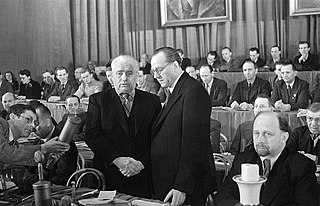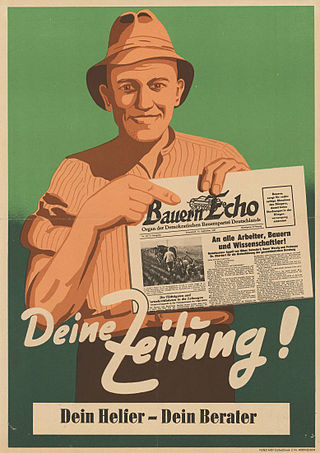
Horst Sindermann was a Communist German politician and one of the leaders of East Germany. He became Chairman of the Council of Ministers in 1973, but in 1976 he became President of the Volkskammer, the only member of the Socialist Unity Party of Germany to hold the post.

The Communist Party of Germany is a Marxist-Leninist communist party in Germany. It is one of several parties which claim the KPD name and/or legacy. It was founded in Berlin in 1990. The party is also commonly referred to by the name KPD-Ost to differentiate it from other parties with the same name, most prominently the historical Communist Party of Germany.
Wilhelm Kling was a Communist Party of Germany (KPD) functionary, and later an associate in the Politburo of the Central Committee of the Socialist Unity Party of Germany (SED) in East Germany.

The Ulbricht Group was a group of exiled members of the Communist Party of Germany and the National Committee for a Free Germany, led by Walter Ulbricht, who flew from the Soviet Union back to Germany on April 30, 1945. Composed of functionaries from the KPD and ten anti-fascist prisoners of war, their job was to seek out anti-fascist individuals and prepare the groundwork for the re-establishment of communist organizations and unions in postwar Berlin. There were two additional regional groups, the Ackermann Group in Saxony and the Sobottka Group in Mecklenburg. Many of the group's members later became high-level officials in the government of the German Democratic Republic (GDR).

Max Seydewitz was a German politician. Between 1947 and 1952 he was the Minister-President of Saxony in the German Democratic Republic.

Erich Mückenberger was a German socialist politician. He began his political career in the Social Democratic Party of Germany (SPD). He became a member of the Socialist Unity Party of Germany (SED) when the East German branches of SPD and the Communist Party of Germany merged after the Second World War. Mückenberger was one of the most high-ranking former Social Democrats in the German Democratic Republic and held several positions in the SED.

Rudolf Herrnstadt was a German journalist and communist politician. After abandoning his law studies in 1922, Herrnstadt became a convinced communist. Despite his bourgeois origins, he was accepted into the Communist Party of Germany (KPD) in 1931 and worked for the Soviet military intelligence service Glawnoje Raswedywatelnoje Uprawlenije. As a foreign correspondent for the Berliner Tageblatt, he worked in Prague (1930), Warsaw and Moscow (1933). He emigrated to the Soviet Union in 1939, days before the Invasion of Poland, where he was active in the fight against the Nazi state as editor-in-chief of the newspaper Freies Deutschland in the National Committee for a Free Germany from 1944 during the German-Soviet War.

Wilhelm Koenen was a German communist activist and an East German politician. He was married to Emmy Damerius-Koenen and was the father of Heinrich Koenen and Johanna Koenen.

The Communist Party of Germany (KPD) and the east German branches of the Social Democratic Party of Germany (SPD) merged to form the Socialist Unity Party of Germany (SED) on 21 April 1946. Although nominally a merger of equals, the merged party quickly fell under Communist domination and developed along lines similar to other Communist Parties in what became the Eastern Bloc. The SED would be the only party of the German Democratic Republic until the end of the republic in December 1989. In the course of the merger, about 5,000 Social Democrats who opposed it were detained and sent to labour camps and jails.

Das Volk was a daily newspaper published from Berlin, Germany. It was the central organ of the Social Democratic Party of Germany (SPD). The first issue of Das Volk was published on 7 July 1945. Das Volk was the second "working-class newspaper" to emerge in Berlin after the Second World War — the first having been the Communist Party of Germany (KPD) organ Deutsche Volkszeitung. During its first twenty days of publishing, Das Volk was printed in Berliner format. Das Volk heeded the KPD's calls for building an anti-fascist democratic Germany, a parliamentary democratic republic, and unity of the working class. The newspaper was controlled by the left-wing tendency inside the SPD, and supported merger of the party with the KPD.

Deutsche Volkszeitung was a newspaper published daily from Berlin, Germany between 1945–1946. It was the organ of the Central Committee of the Communist Party of Germany (KPD).

Walter Buchheim was an East German politician and Trade unionist.

Leonhard Helmschrott (born 5 June 1921 ; died 28 October 2011 was a German journalist and politician. He was a founding member of the National Committee for a Free Germany . Between 1948 and 1989 he was the chief editor of the Bauernecho .
Christian Mahler (1905-1966) was a Communist Party activist who resisted Nazism and spent most of the Hitler period in forced custody. After 1945 he became a party functionary in the German Democratic Republic and then an increasingly senior Police officer. He concluded his career as the first director of the Sachsenhausen National Memorial.
Hermann Weber was a German historian and political scientist. He has been described as "the man who knew everything about the German Democratic Republic".

Klaus Huhn was a German sports journalist, writer and sports administrator. Huhn worked for the East German mass-market daily newspaper, Neues Deutschland, and was chairman of the Sports Journalists Sub-Association within that country's important Union of Journalists.
Lieselotte Thoms-Heinrich was a journalist and officially mandated feminist. Between 1968 and 1981 she was editor in chief of the mass circulation women's magazine, "Für Dich". She was also a member of the national parliament ("Volkskammer") between 1963 and 1981.

Olga Körner was a German political activist and a co-founder of the proletarian women's movement in Dresden. Between 1930 and 1933 she sat as a member of the national parliament ("Reichstag").
Margot Pfannstiel was a German journalist and author. She was Editor in Chief of the East German women's magazine Sibylle between 1958 and 1968. Both before and after her decade at Sibylle she was a chief reporter at the weekly news magazine Wochenpost.
Erich Ernst Kops was a German politician, diplomat, and Holocaust survivor.
















